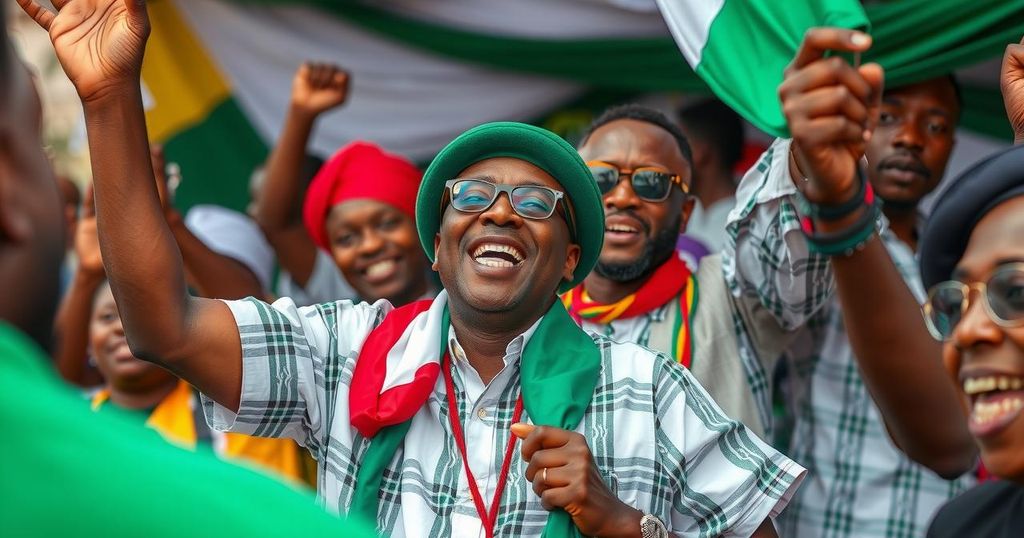Ghana’s opposition party, the NDC, claims provisional results suggest their candidate, John Mahama, has won the presidential election against Vice President Mahamudu Bawumia. Economic issues dominated the election as voters faced high inflation and discontent over government policies. Violence marred the electoral process, but historically, Ghana maintains stable democratic practices with alternating party governance since 1992.
On Sunday, Ghana’s opposition party, the National Democratic Congress (NDC), declared that preliminary results from the recent presidential election indicated their candidate, John Mahama, as the victor. In contrast, electoral authorities are still in the process of compiling the official vote counts. The election featured a contest between Mahama and the ruling New Patriotic Party (NPP) candidate, Vice President Mahamudu Bawumia, who sought to distance himself from voter dissatisfaction regarding the government’s economic policies and rising living expenses.
The focal point of the election was Ghana’s struggling economy, which has faced challenges such as debt defaults, currency devaluation, and significant inflation, ultimately leading to a $3 billion bailout from the International Monetary Fund (IMF). Voters were determining a successor to Bawumia’s superior, President Nana Akufo-Addo, who is completing his maximum term limit of two four-year terms. In addition to the presidential election, a new parliament was also being elected.
Sammy Gyamfi, a spokesman for the NDC, informed the press that the party’s analysis indicated Mahama received 56.3 percent of the vote compared to Bawumia’s 41.3 percent. Gyamfi articulated, “It is very clear the people of this country have voted for change.” Furthermore, ChannelOne TV’s results from 42 of the 276 constituencies reflected Mahama in the lead. While political parties have representatives at polling stations to monitor and calculate initial vote tallies, official results from the election commission were still pending, with anticipation of their release by Tuesday.
Despite the voting proceeding with relative tranquility, incidents of violence were reported, including two fatal shootings. Historically, Ghana exhibits a pattern of democratic stability, with the NPP and NDC alternating control since the revival of multi-party democracy in 1992. Bawumia’s campaign slogan, “Break the 8,” aimed to secure an unprecedented third consecutive term for the NPP, although he struggled to overcome criticism directed at Akufo-Addo’s economic management. Despite a reduction in inflation from over 50 percent to approximately 23 percent, socioeconomic challenges remained a pivotal issue for voters, enabling Mahama’s attempt at a political comeback after previous unsuccessful presidential campaigns.
Ghana’s political landscape has been characterized by alternating power between the NPP and NDC since the return to democracy in the early 1990s. The 2023 presidential election marks a significant moment in this ongoing political rivalry, with key issues focused on economic management amidst rising inflation and public discontent. Given recent financial strains on the economy, voter sentiment has shifted, presenting an opportunity for opposition parties to capitalize on government shortcomings. Mahama’s previous tenure and his attempts to regain the presidency form an integral part of the election narrative. The involvement of international financial organizations, such as the IMF, in Ghana’s economic affairs further underscores the challenges facing the nation’s governance. As citizens elect a new parliament while deciding on the presidency, the implications of their choices could shape the future trajectory of the country’s democracy and economic resilience.
In summary, the recent presidential election in Ghana is revealing significant exploratory dynamics between the ruling party and the opposition, with preliminary results favoring John Mahama of the NDC. Economic challenges, including rising inflation and public discontent with the government’s policies, have surfaced as critical issues driving voter sentiment. With official results pending, the political landscape remains cautious yet indicative of a desire for change among the electorate.
Original Source: www.barrons.com







